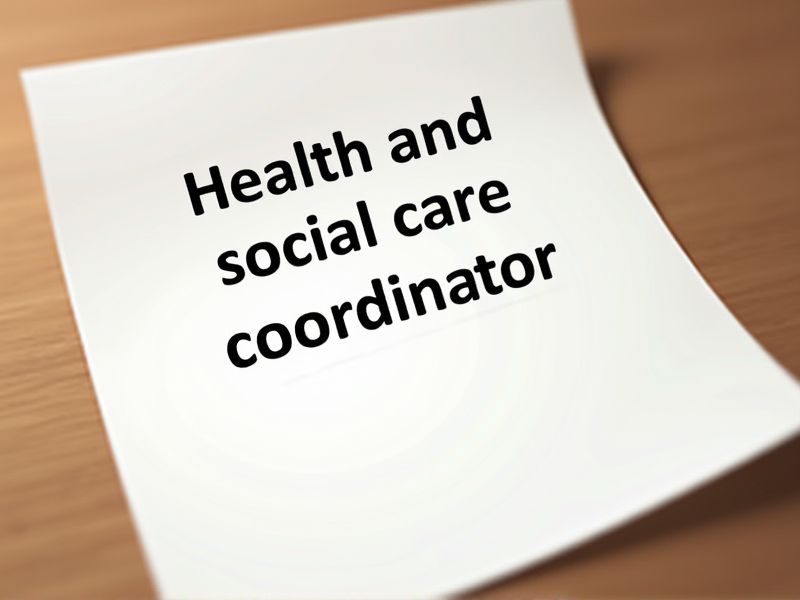
Health and social care coordinators play a pivotal role in ensuring seamless service delivery across healthcare settings, interfacing with both patients and providers to optimize outcomes. Certification in this field typically signals a comprehensive understanding of healthcare regulations, patient management, and effective communication strategies. Healthcare institutions often require specific credentials to ensure coordinators are equipped to handle the diverse and complex needs of patients. Some important certifications you may need as a health and social care coordinator include the following.
Registered Manager Award (RMA) in Health and Social Care
The Registered Manager Award (RMA) in Health and Social Care is needed because it provides essential leadership skills, enabling coordinators to effectively manage and guide their teams. This qualification enhances understanding of regulatory frameworks, ensuring compliance with industry standards and improving service quality. RMA participation fosters personal and professional growth, which is crucial in adapting to evolving healthcare challenges. It equips coordinators with advanced problem-solving abilities, aiding in better decision-making in complex care environments.
Certificate in Health and Social Care Management
A Certificate in Health and Social Care Management equips coordinators with essential skills in leadership and administration, crucial for effective team management. It provides a foundational understanding of healthcare policies and regulations, ensuring compliance and quality service delivery. The program fosters problem-solving and decision-making abilities, necessary for navigating complex care scenarios. Accreditation from such a course often enhances career prospects and professional credibility in the health and social care sector.
Certified Care Manager (CCM)
A Certified Care Manager (CCM) brings specialized knowledge and skills critical for effectively coordinating comprehensive health and social care services, ensuring clients receive integrated support. With the complexities in healthcare systems, individuals with a CCM certification can navigate and optimize resources more efficiently. Their expertise in assessment and planning can lead to improved patient outcomes and satisfaction by aligning care plans with personal health goals. Legal and ethical training inherent in the CCM certification helps maintain a high standard of care and compliance with regulations.
Diploma in Health and Social Care Administration
A Diploma in Health and Social Care Administration equips coordinators with essential knowledge of healthcare policies and regulations, ensuring compliance and operational efficiency. Understanding administrative procedures enhances resource management and improves service delivery for patients. Effective communication skills gained through the diploma help in coordinating multidisciplinary teams and liaising with stakeholders. Informed decision-making, rooted in a comprehensive educational foundation, directly impacts the quality of care provided within health and social care settings.
CPR and First Aid Certification
Health and social care coordinators must hold CPR and First Aid Certification to effectively respond to medical emergencies and provide immediate care, potentially saving lives. This certification ensures they possess the necessary skills to stabilize injured or ill individuals until professional medical help arrives. Being certified also aligns with regulatory requirements and enhances trust and confidence among patients and their families. Continuous training in CPR and First Aid keeps coordinators updated on best practices, ensuring effective risk management in healthcare settings.
Manual Handling Certification
Manual Handling Certification is needed for a Health and Social Care Coordinator because it ensures compliance with health and safety regulations, reducing the risk of workplace injuries. Proper training minimizes the potential for harm to both staff and individuals receiving care, improving overall service quality. The certification helps coordinators understand proper lifting techniques, leading to fewer musculoskeletal disorders among staff. This training also fosters a safer working environment, thereby decreasing downtime and increasing productivity.
Safeguarding Vulnerable Groups Certification
Safeguarding Vulnerable Groups Certification ensures health and social care coordinators can recognize and respond to signs of abuse or neglect. It equips professionals with the knowledge to create safer care environments, protecting individuals from harm. Having this certification improves trust and reliability within the community, as coordinators are recognized as competent in safeguarding matters. Regulatory compliance is strengthened, as organizations often require staff to be certified to meet legal and ethical standards.
Risk Management in Health and Social Care Certification
Risk Management in Health and Social Care Certification equips coordinators with the necessary skills to identify potential hazards, reducing incidents that could compromise patient safety. Certification ensures that coordinators are proficient in developing and implementing strategic policies that minimize risks. Trained coordinators can improve organizational outcomes by systematically addressing potential threats to service delivery. Proper risk management practices foster a safer and more reliable environment for both patients and staff.
Dementia Care Specialist Certification
Dementia Care Specialist Certification equips health and social care coordinators with targeted skills to manage the complexities of dementia, improving patient outcomes. The certification ensures that coordinators possess the latest evidence-based practices in dementia care, which enhances the quality of care provided. As dementia cases rise with an aging population, this certification is crucial for meeting the increasing demand for specialized care. It empowers coordinators to effectively support both patients and their families, addressing challenges specific to dementia.
Leadership in Health and Social Care Certification
Leadership in Health and Social Care Certification equips coordinators with critical decision-making skills needed to navigate complex situations. The acquired knowledge enhances their ability to manage teams effectively and allocate resources efficiently. Certification provides a comprehensive understanding of regulatory compliance, improving care quality and safety. It also fosters personal development and professional credibility, leading to improved job performance and career advancement opportunities.
Summary
With certifications, you can significantly enhance your knowledge and skills in coordinating health and social care services, leading to more effective and efficient care delivery. You may also gain increased credibility and trust from colleagues and clients, which can result in more collaborative and successful partnerships. Your career prospects are likely to improve, as certifications often open up new opportunities for career advancement or specialized roles. Consequently, the overall quality of care and service coordination typically sees notable improvements due to your heightened expertise.
